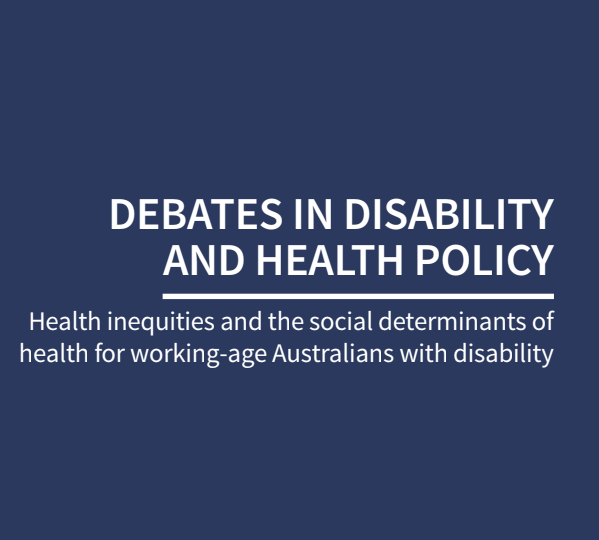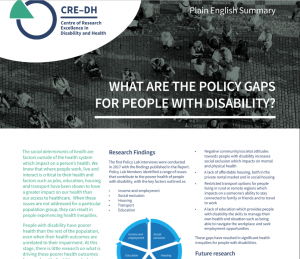What are the health policy gaps for people with disability?
The social determinants of health are factors outside of the health system which impact on a person’s health. We know that where people work, live and interact is critical to their health. We also know that jobs, education, housing and transport have a greater impact on our health than our access to healthcare. When these issues are not addressed for a particular population group, they can result in people experiencing health inequities.
People with disability have poorer health than the rest of the population, even when their health outcomes are unrelated to their impairment. At this stage, there is little research on what is driving these poorer health outcomes and what health inequities are being experienced as a result.
Policy Lab
To gain new knowledge on the social determinants of health for working-age Australians with disability, we started a ‘Policy Lab’ with 30 members involved in disability and health policy across government and disability organisations, some in disability employment, transport and education. We interview our Policy Members twice a year to hear about issues and to find practical solutions to reduce health inequities for Australians with disabilities.
Research Findings
The first Policy Lab interviews were conducted in 2017 and we published the findings in a report with a summary document (see below). Policy Lab Members identified a range of issues that contribute to the poorer health of people with disability, with the key factors outlined as:
- Income and employment
- Social exclusion
- Housing
- Transport
- Education
All these are interconnected which affect and impact others. A number of other issues were identified as:
- A lack of employment opportunities for people with disability and the jobs which are available are often poorly paid
- Discrimination against people with disabilities when seeking work
- Negative community attitudes towards people with disability increases social exclusion which impacts on mental and physical health
- A lack of affordable housing, both in the private rental market and in social housing
- Restricted transport options for people living in rural or remote regions which impacts on a someone’s ability to get to work, and to keep in contact with family and friends
- A lack of education which provides people with disability the skills to manage general issues with their own health and other circumstances such as being able to navigate the workplace and find a job.
These gaps have resulted in significant health inequities for people with disabilities.
Future research
In future interviews with our Policy Members, we will explore how to address these important issues.
This knowledge will then contribute and shape our research. In this way we create a multi-disciplinary exchange of knowledge that captures the range of issues that impact on people with disabilities.
Further information
The Report and Summary can be downloaded as pdf documents below. If you would like a Word version, please email: cre-dh@unimelb.edu.au
- Read the Debates in Disability and Health Policy 2018 Report (pdf file)
- Download the plain English Summary (pdf file)
For specific information about the Policy Program, please contact Celia Green


